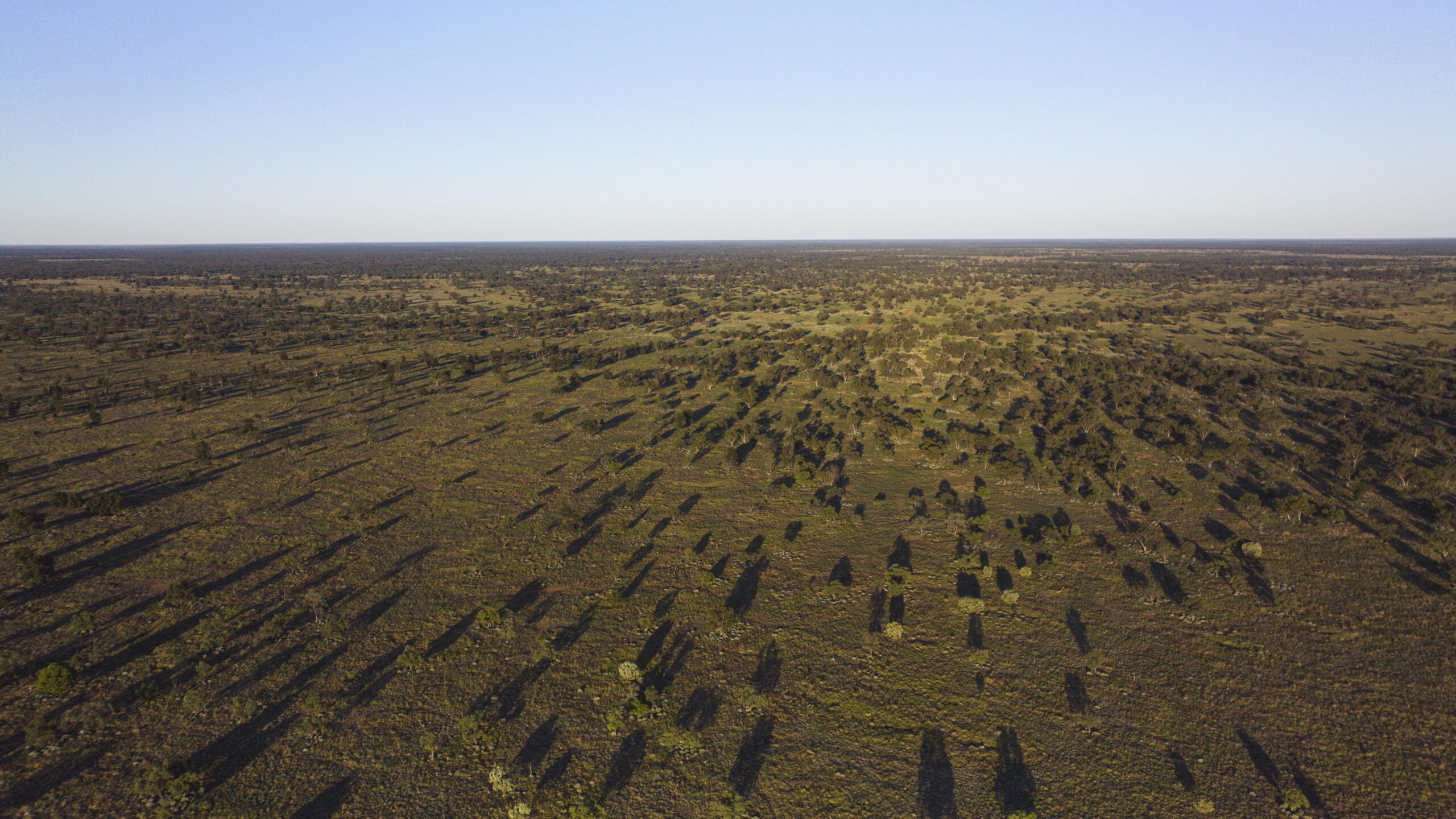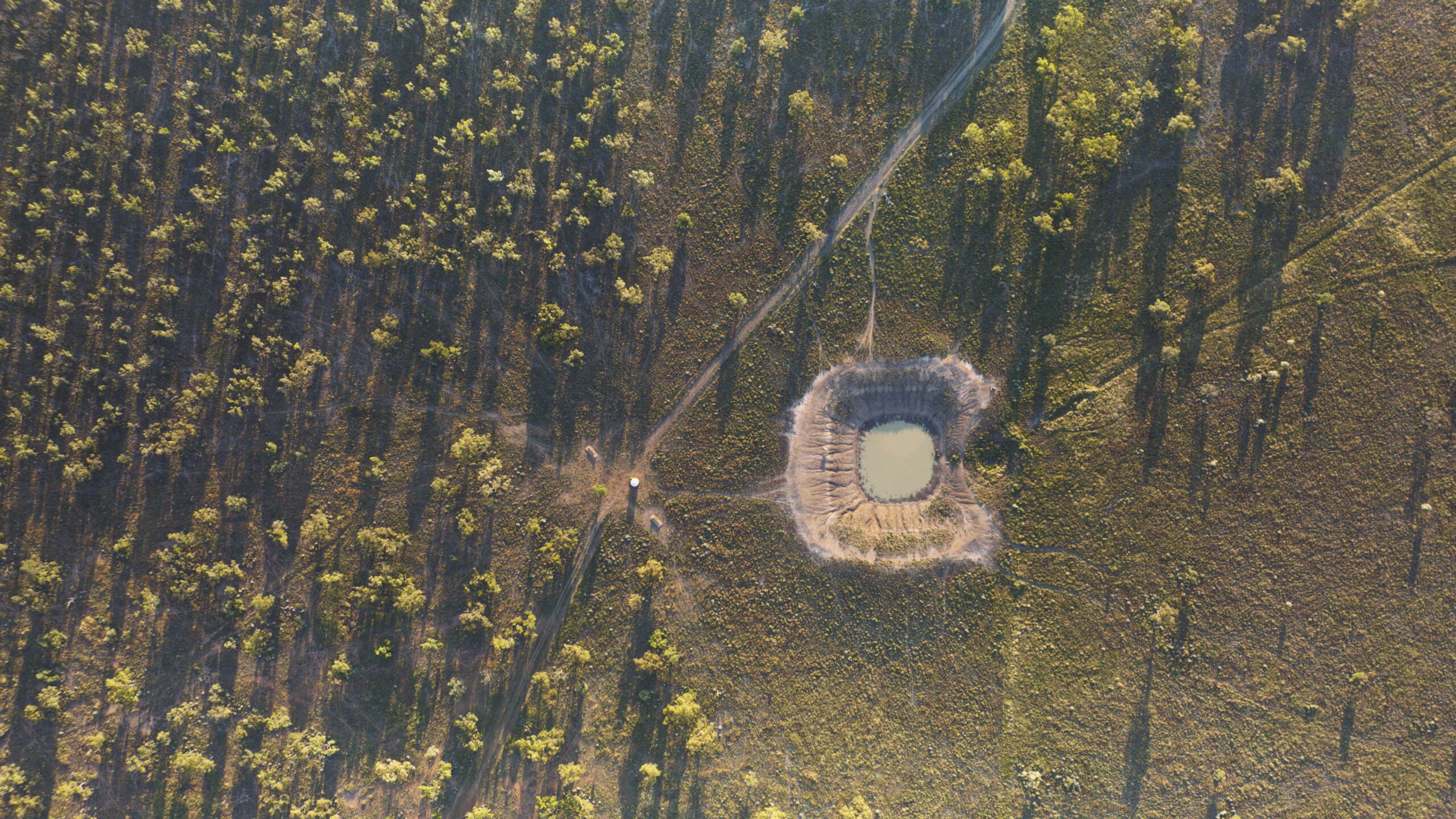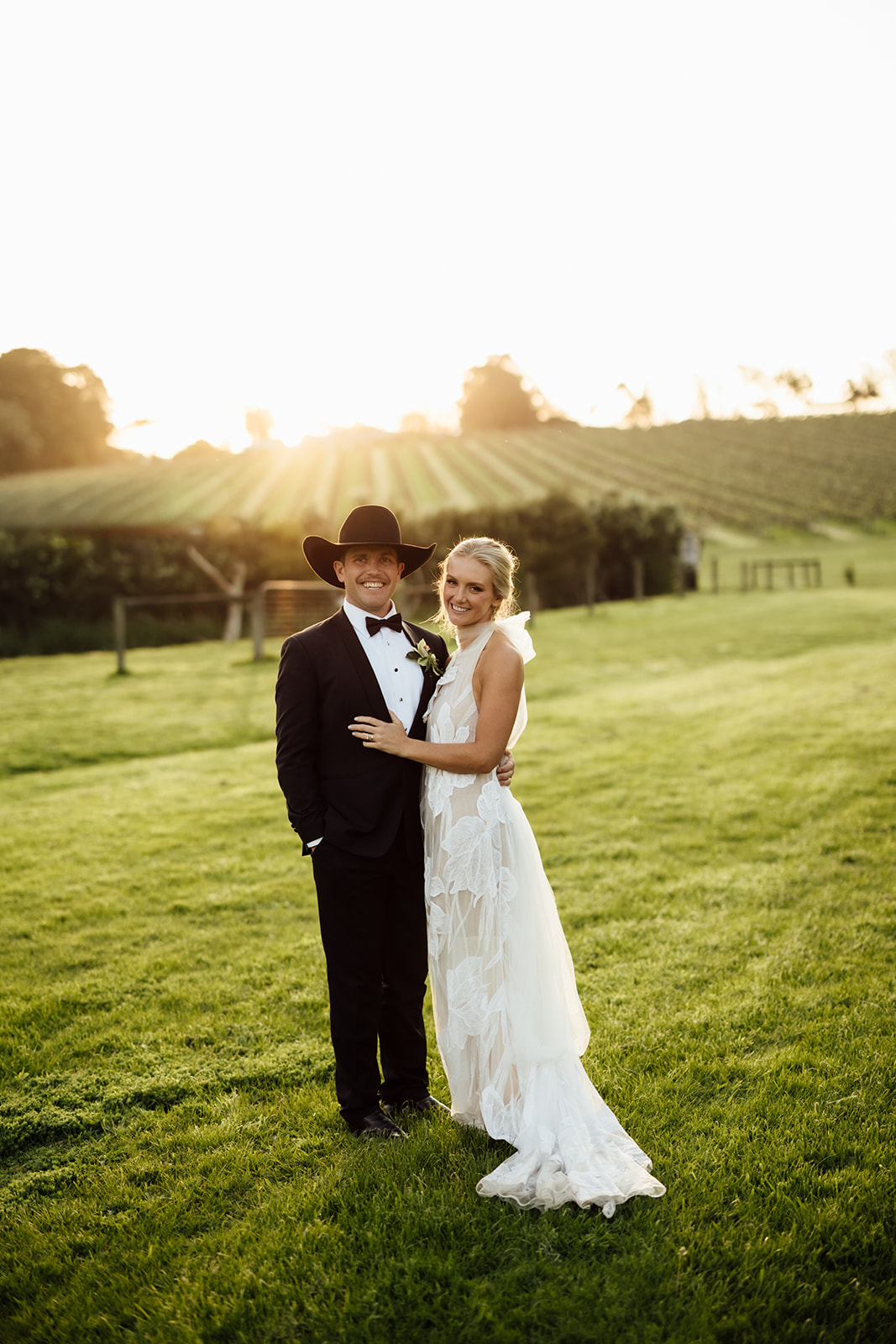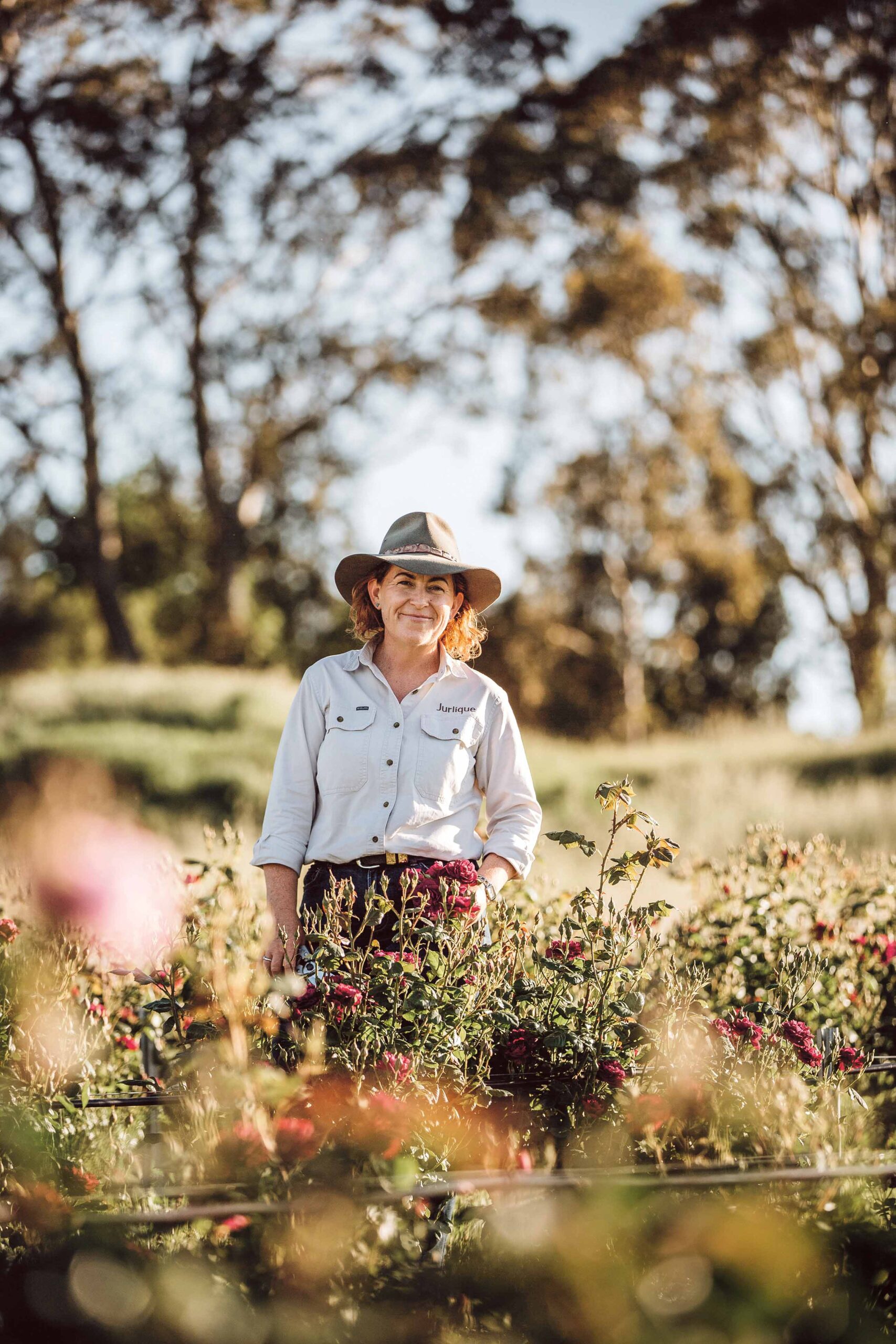Photography Alexandra MacAlpine
Sign up to our mailing list for the best stories delivered to your inbox.
WORDS AND PHOTOGRAPHY ALEXANDRA MACALPINE
This land is different. Back home, I sit at my desk and from my window I view green grass, tree-lined fences and the start of the well-loved, well known laneway. From there, the land slowly rises to meet the sky. The soft, eucalypt-covered Weddin Mountains complete my office view. The colours of those mountains change throughout the day from a stark, glary blue to a warm hue that hovers somewhere between orange and indigo depending on the season we’re in.
But in this unfamiliar territory there is no hill in sight. The land stretches so far, I often must turn away and rub my eyes from staring at the distant horizon, where never-ending land meets never-ending sky. It may be strange to me, yet it’s home to my husband Alex. He spent his childhood here among the Mitchell grass, crowfoot and leopardwood trees of the Great Artesian Basin. Although I have spent the past seven years visiting this land that Alex calls home, I’m still so bewildered as to what I see before me.
Fifty-five thousand acres of space. Just space. I find it hard to even begin thinking about the sheer size of that space. “Have you ever ridden a horse or a motorbike or a pushbike from one end of the property to the other?” I once asked Alex. He looked back at me with a cheeky smirk, his dark rugged eyebrows puzzled as to why that’s always the first question people ask when he tells them where he grew up. “It’s a genuine question,” I continue. “No, Doris,” he eventually tells me with a smile, “I haven’t.” Doris is his term of endearment.
Salisbury is located in The Marra, 640 kilometres north-west of Sydney. The nearest town for supplies, Nyngan, is a 90-minute drive away. The area might be isolated, but the community is connected. Salisbury has been home to Alex ever since he was born. Even though we now live in the Central West, Salisbury is still the place Alex calls home, and I can see why. It’s that feeling of freedom. Your imagination is left to run wild. Alex often tells me of the adventures he and his three siblings would have. They’d hop on their pushbikes and explore the land, often stumbling across an emu or a wild pig.
Out there, it’s a mixture of rich, clay-based soil that shifts from jet black to terracotta. The driveway is a drive in itself. Fifteen kilometres running so straight, you hardly need to touch the steering wheel. The dust flies from behind our white ute, swirling in the air before slowly drifting back down to settle. As soon as we hit that driveway, Alex’s window always comes down.
It’s that feeling of contentment. Memories he holds dear. The smell of a gidgee tree after a shower of rain, catching yabbies in Marra Creek, or a bore bath in the warmest of waters from the Great Artesian Basin. These are the things that define home for Alex. And I am beginning to feel the same.
As we turn the only corner of the Salisbury driveway to get to the homestead, we’re transported from the saltbush-spotted plains to a leafy haven. Red box eucalyptus trees form a welcoming arch. Sheltered and shaded, it feels like it drops almost 10 degrees as soon as you arrive within the homestead pocket. We’re always greeted by Jack, the Kelpie–Collie cross, followed by my father-in-law, Pa, as he’s affectionately known to his grandchildren. He’ll appear from within his workshop holding a dirty rag and some engine part. The creases on his hands are always the colour of grease, and his glasses sit perched on the tip of his nose. Pa is quite the self-taught mechanic. You’ve got to be when your nearest town is almost 140 kilometres away. My mother-in-law is never far behind. By the time we’ve said hello to Pa, there she will be, with hugs that envelope you and make even the dreariest thoughts disappear. As soon as she greets us, she tells us the kettle is on. She’s always the smell of shea butter and jasmine, due to the hand cream she routinely applies while standing next to the kitchen sink.

Photography Alexandra MacAlpine

Photography Alexandra MacAlpine
It’s the swinging of the olive-green coloured gate as you enter the homestead sanctuary. It makes an eerily screeching sound, like it’s begging for a bit of WD-40 on its hinges. Once the gate crashes closed behind you, there comes another familiar sound — the dangling chimes located at the front door. They sway ever so gently with a chorus of pings and pangs, jangles and dingles as the wind softly pushes them back and forth. As you open the screen door, which also sings a creaky song, the kettle, as promised by my mother-in-law, is in fact boiling and has just finished its own bubbling tune.
There’s always much to do on the Salisbury property and it’s never long before Alex grabs his Akubra, pulls his boots on and is out the door. He’s eager to see what has happened since his last visit. His brother William soon arrives from the nearby cottage he shares with his wife and two children. No doubt keen for a cuppa and biscuit, he’s missed that chance. There’s work to be done now help has arrived.
Ninety per cent of the time I’ll cheerfully stay within the homestead, keen to catch up with my mother-in-law and relieved to stay out of the intense heat. But this time I’m eager to see the land. After years of intense drought, followed by two years of above-average rainfall, Salisbury is now its own oasis. The grazing pastures have returned to this property and so too has the menagerie of Merino sheep, Rangeland goats and Bos taurus cattle.
I jump into the side-by-side with Alex and we’re off. Give me 10 minutes and I’ll have completely lost my sense of direction. How can you tell where you are, when a single paddock is the size of a small town? I ask Alex where the homestead is and he intuitively points in its direction. I take a moment to jot that down in my mental list of ‘things I should remember in case I ever get lost at Salisbury’. It’s a recurring concern that I have.
As we coast through the paddock known as Kerrigans, emus emerge groggily from under trees were they were dozing in the shade, and kangaroos vault from the dam wall. Zigging and zagging, their long tails beating time with their leaps. We’re searching for a mob of cattle. It’s been a while since they’ve been glimpsed in this 1620 hectare paddock. It is customary for this mob of cattle to bolt as soon as they hear a motor. Having previously been mustered by aeroplane, they’re quick to dart in a direction where the sound decreases rather than increases.
It’s not long before we find them on a trail weaving in and out of the saltbush scrub. A mixture of old-man, bladder and pop saltbush varieties are often found here. The tiny path gradually merges into a larger track that leads the cattle to who knows where. This property feels boundless. One-by-one they follow each other, leaving very little space in between. They gallop at a pace so quick it’s hard to keep up. So rather than chase them, we decide to sit. With the motor switched off, the sound of silence soon returns to the vicinity. We watch as the cattle relax and their canter returns to a trot.
As the sun sets, the colours of the land dramatically change. Soft muted tones of pink appear in the sky. That distinct scent of gidgee trees fills the air. The Major Mitchell cockatoos soar from one whitewood tree to another; their calls echoing through this vast space. And I think how lucky are we to have a home away from home.
Alexandra MacAlpine lives on Parkwood, a sheep and grazing property in the Central West of New South Wales. Follow Graziher on Instagram to see her ‘Thoughts on a Laneway’ reels.

The Mornington Peninsula has never seen so many cowboy hats — but for Greta Stonier and Ben Ryan, the winery was the only venue that made sense.

Raised on a dairy farm near Hahndorf, SA, farm manager Cherie Hutchinson has a deep love for the land she works on.